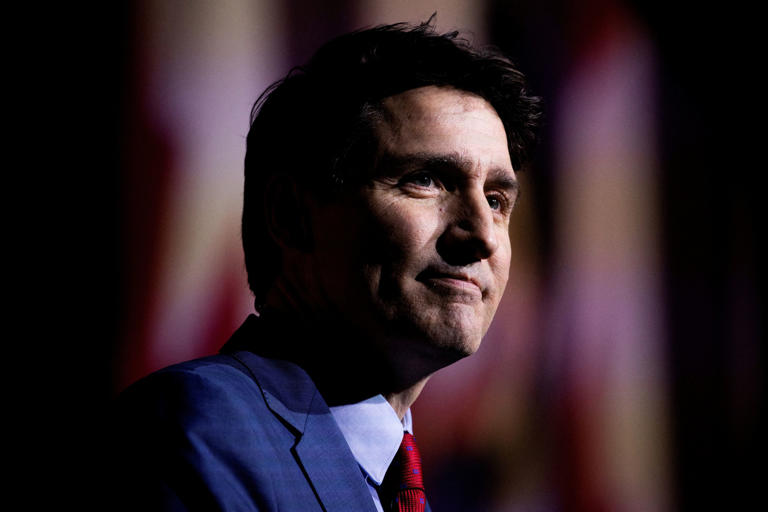“Canada’s Future: What Comes After Trudeau’s Leadership?”
Trudeau, who rose to power in 2015 on promises of “sunny ways” and became a global symbol of liberal and progressive politics, will continue to serve as prime minister until a successor is chosen. His decision follows growing unrest within the Liberal caucus, which escalated after Deputy Prime Minister and Finance Minister Chrystia Freeland resigned last month. Freeland’s departure, accompanied by a resignation letter questioning Trudeau’s leadership, intensified calls for change within the party.
As the son of former Prime Minister Pierre Elliott Trudeau, Justin Trudeau’s political journey has been marked by significant achievements. He won three consecutive elections in 2015, 2019, and 2021—a rare feat in Canadian politics. However, his popularity has waned over the years, and the Liberals now trail Pierre Poilievre’s Conservatives by more than 20 points in the polls. For Trudeau’s eventual successor, closing this gap ahead of the next federal election—scheduled by October but possibly sooner—will be an uphill battle.
“It’s very much a journey from ‘sunny ways’ to the haze and rubble of political wear and tear after nearly a decade of Justin Trudeau’s leadership,” said Shachi Kurl, president of the Angus Reid Institute.
Why Did Trudeau Resign?
Trudeau’s decision comes against a backdrop of declining approval ratings and increasing voter dissatisfaction. Like many Western leaders post-pandemic, he faced challenges such as rising costs of living, soaring interest rates, a housing crisis, and growing concerns about immigration.
Adding to this was the rise of Pierre Poilievre, a populist leader who has energized the Conservative base with direct messaging: “Ax the [carbon] tax, build the homes, fix the budget, stop the crime.” Poilievre’s approach has resonated with voters frustrated by economic pressures.
Freeland’s resignation proved to be the tipping point. Often referred to as the “Minister of Everything” due to her pivotal role in the cabinet, Freeland was one of Trudeau’s most trusted allies. She revealed that Trudeau had removed her as finance minister and offered a different cabinet position, which she considered a demotion. Freeland resigned, noting concerns about Trudeau’s preparedness for political challenges.
On Monday, Freeland thanked Trudeau for his service in a post on X (formerly Twitter), stating, “I wish him and his family the very best.”
What Happens Next?
Trudeau announced that the Liberal Party would launch a nationwide leadership contest to choose his successor. Liberal Party President Sachit Mehra confirmed on X that the party’s national board would meet this week to begin the process.
In the interim, Governor General Mary Simon, Canada’s representative of King Charles III, approved Trudeau’s request to prorogue Parliament until March 24. When Parliament reconvenes, it will begin with a Speech from the Throne outlining the government’s priorities—a vote of confidence that the government must pass to remain in power.
Canada now looks ahead to a period of political transition, as the Liberals seek new leadership to navigate a challenging electoral landscape.
Who Are the Possible Contenders to Succeed Trudeau?
The race to succeed Justin Trudeau as leader of the Liberal Party has already sparked speculation. Potential candidates include Finance Minister Dominic LeBlanc, Foreign Minister Mélanie Joly, and Innovation Minister François-Philippe Champagne, along with former Deputy Prime Minister Chrystia Freeland, whose resignation catalyzed Trudeau’s decision to step down.
Several prominent outsiders are also seen as potential contenders. These include Christy Clark, a former premier of British Columbia, and Mark Carney, the former governor of the Bank of Canada and the Bank of England.
What Challenges Will Trudeau’s Successor Face?
The new leader of the Liberal Party will inherit a daunting array of challenges. These include skyrocketing costs of living, a severe housing crisis, and a Canadian electorate increasingly disillusioned with nearly a decade of Liberal governance.
Adding to these domestic challenges, the political landscape is fragile. Trudeau’s minority government relies on support from opposition parties to pass legislation and stay in power. Some opposition leaders have already indicated plans to trigger an election once Parliament resumes.
Yves-François Blanchet, leader of the Bloc Québécois, stated Monday, “There’s no significant difference between the Liberal Party that we know and the Liberal Party that will be presented to us after there is a new leader,” calling for an election sooner rather than later.
If an election is called, the new leader could face the daunting task of rallying the party and narrowing a substantial polling gap with Pierre Poilievre’s Conservatives.
What Does This Mean for U.S.-Canada Relations?
Canada’s relationship with the United States is entering a precarious phase. While ties improved under President Joe Biden following a strained relationship during Donald Trump’s first term, the political upheaval in Ottawa comes at a critical moment. Trump, now president-elect, has promised steep tariffs on Canadian goods unless Canada imposes stricter border controls on what he calls an “invasion” of drugs and migrants.
Trump’s proposed 25 percent tariffs could deliver a devastating blow to Canada’s economy, potentially triggering a recession. Canadian officials have contested Trump’s claims, noting that only 1.5 percent of migrants apprehended by U.S. Customs and Border Protection and 0.2 percent of fentanyl seized at U.S. land borders originate from Canada.
Despite efforts by LeBlanc and Joly to present border-tightening measures to the incoming administration, Trump shows no signs of relenting. Many analysts believe his complaints about trade deficits and border issues may be a pretext for imposing tariffs.
Complicating matters further, if members of Trudeau’s cabinet resign their roles to run for party leadership, it could weaken Canada’s ability to engage with the Trump administration.
Adding to the tension, Trump has taunted Canada and Trudeau, calling him the “Governor” of the “51st state of Canada.” While Canadian officials have downplayed these remarks as jokes, others view them as threats to Canada’s sovereignty and have criticized the government’s muted response.
In the months ahead, Trudeau’s successor will face the dual challenge of addressing pressing domestic issues while navigating an increasingly unpredictable relationship with Canada’s largest trading partner.

